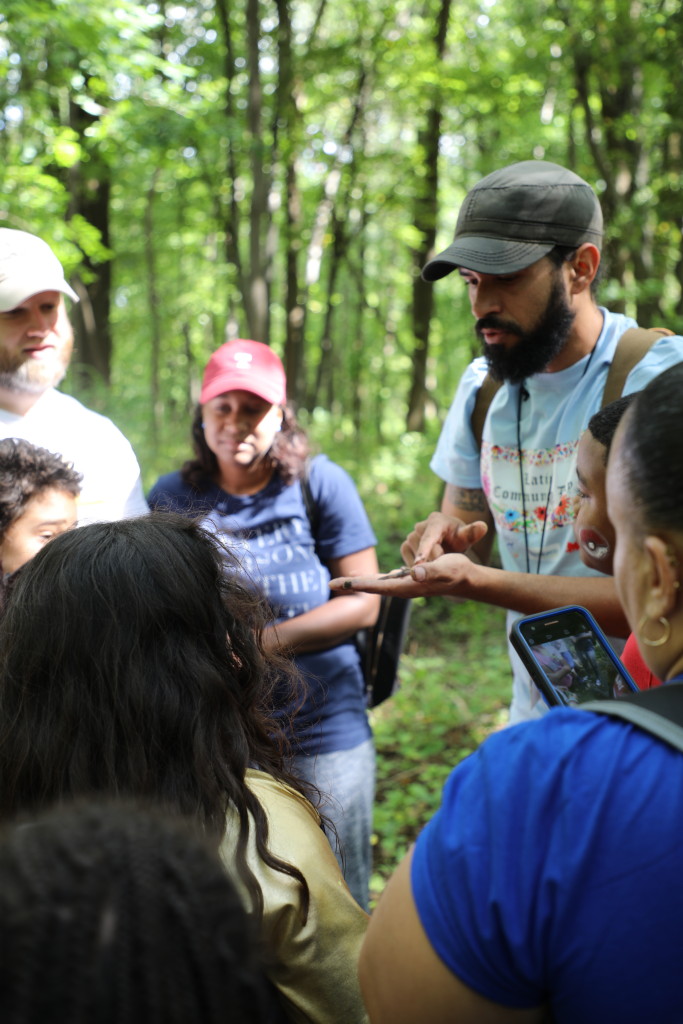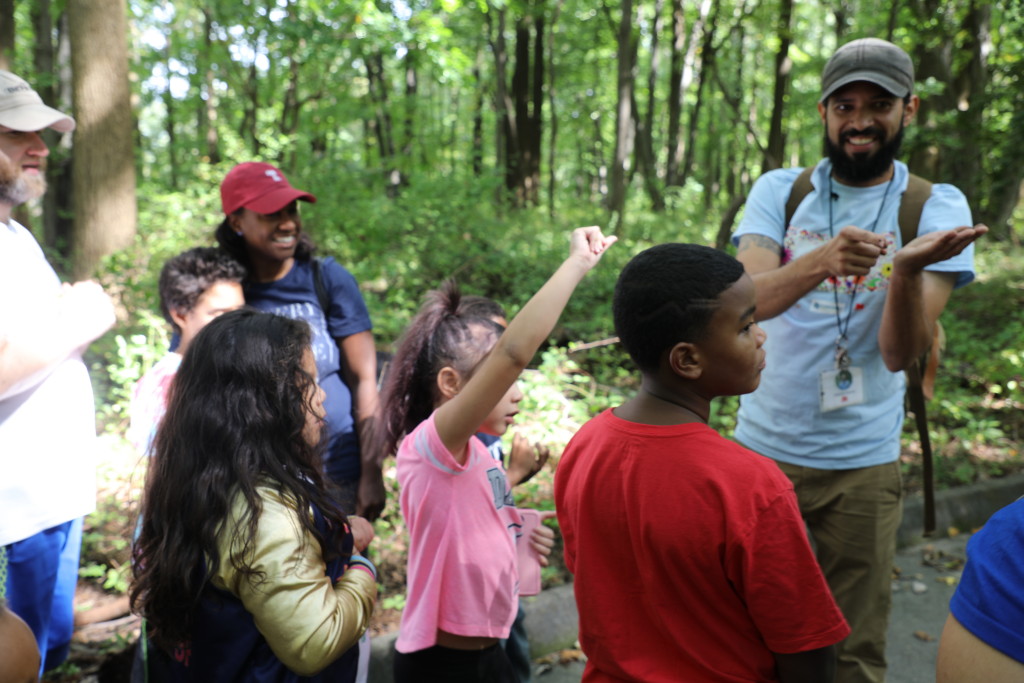By Mike Weilbacher
While the Federal government remains mired in the longest shutdown ever (I am writing this on Sunday, so the fluid situation may change dramatically by the time you read this), a new caravan was scheduled to leave Honduras this week, thousands more beginning the long trek north to Mexico and the U.S.
This sad, hard, complex situation brought me to Eduardo Duenas, the Schuylkill Center’s Manager of School Programs, an educator on our staff who oversees a cadre of educators that help him teach school children on their visits here. A native Honduran, Eduardo has been in America for most of the last four years, the Schuylkill Center for the last two, and has permanent resident status with the U.S. Citizenship and Immigration Services. He’s married to an American citizen, and they are raising twin infant sons.
And he’s easily the biggest– or at least the most vocal– Eagles fan on our staff, bleeding Eagles green.
Of the caravans, Eduardo, who knows some of the people assembling in the current caravan, says, “I feel sad. These people don’t want to leave. They don’t want a car or a pool– they just want to eat, they just want their kids to eat. Seven out of 10 Hondurans,” he continued, “are eating only once a day, and foreign aid from countries like the U.S. is not getting to the people. They rather die trying to get into the U.S. than watch their kids starve. If they had most of the basic things they need, they would not come.” Joining a caravan, he says, for many is “pure necessity.”
He visited Honduras with his family over the Christmas break, some of his kin meeting his sons for the first time, and came back devastated– his home city of La Ceiba on the Caribbean coast “has never been so dirty,” and was surprisingly empty, almost a ghost town, as many of the Hondurans once there have left for elsewhere.
Like Eduardo himself. Born in Honduras’ capital and largest city, Tegucigalpa, he was mostly raised by his grandmother in a region called Valle del Aguán, literally, the valley of the Aguán River, a river Eduardo knew intimately. “I was happy there,” as a child, he told me. “I’d run to the river almost every day; I loved to fish, loved to swim. I caught snakes, I caught butterflies.” Like so many youngsters his age, he learned how to make slingshots, spending endless hours aiming at poor unsuspecting lizards, an activity he now rues a little. Above him were the mountains, so between river and mountains were “animals of all shapes and sizes, birds of all kinds. I always knew I loved nature study down there.” (Today, as an adult on our staff, he has a great nose for finding turtles, snakes, toads and more on group walks.)
Valle del Aguán is also one of the most fertile regions in Honduras, its rich soil growing coffee, bananas, mangos, pineapples, and more. “But we made deals, stupid deals, with foreign companies for like 100 years for one dollar,” one of the reasons the economy is bankrupt– people don’t control land or agriculture.
He left Valle del Aguán after high school, moving to the larger coastal city of La Ceiba so he could attend university. After an ill-fated stint in law school, he finished a degree in ecotourism, where he could be closer to the animals he loves. He tried making a life in Honduras– he has been a tour guide for ecotourism companies, a fisherman (snorkeling with a spear to catch fish), a landscaper pulling weeds and planting trees, even a street musician and artist; he has tried many things. But after he was pulled over by the police and detained in jail for a full day for no reason, he decided to leave Honduras. “I had to explain to my mother in 2012 that I didn’t have any opportunities in Honduras,” he said.
He went to Costa Rica, where he enrolled in a La Salle University program that led to dual degrees in environmental management and sustainable development. There, he met his wife, a native of Villanova who worked for a company that had offices in Costa Rica. They married in Honduras in 2013, and she soon pushed to live in the U.S., as she thought their chances of making a life were better here.
“But I don’t want to go to a place that doesn’t like me,” he said about his first reaction to America, but ultimately agreed. “I applied for a visa,” he remembered, “but it took more than two years to get an answer.” To his great relief, he has only received support for his being in the United States.
In 2015, he and he wife spotted a pair of baby owls in the middle of a road. Using cell phones, they discovered that the Schuylkill Center ran a wildlife clinic, and were able to rescue one– the second was sadly struck by a passing vehicle as they were getting out of their car. He volunteered for the Toad Detour program, became a Trail Steward, and is now a full-time educator.
So while his journey is uniquely his own, it echoes the tragedy of the current situation in Central America, that thousands of people from Honduras feel their best chance for survival is a dangerous trek north. As the latest caravan starts its long walk north, my thoughts are with Eduardo, his family, his friends, and all Hondurans.
Mike Weilbacher directs the Schuylkill Center for Environmental Education in Upper Roxborough, tweets @SCEEMike, and can be reached at [email protected].


